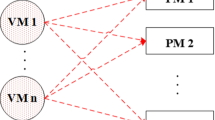Abstract
Execution times are crucial for effectiveness of tasks or jobs scheduling. It is very hard to accurately estimate execution times because they are influenced by many factors. Though there are some models for traditional machine scheduling problems, no attention has been paid on virtual machine scheduling in cloud computing. Based on cloud agent (VM administrator, scheduler or intelligent procedure) experiences, we develop integrated learning effects models to obtain accurate execution times. Based on the constructed learning effects model for single virtual machine scheduling, optimal schedule rules are proposed for minimizing makespan, the total completion time and the sum of (square) completion times. Problems with the total weighted completion time and the maximum lateness minimization are proved to be optimally solvable in polynomial time only for certain assumptions. Furthermore, we adapt the developed learning effects model to two special m-virtual machine MapReduce scenarios, for which optimal schedule rules are introduced correspondingly. Optimal solutions are demonstrated by examples of the problems under study using the constructed rules.



Similar content being viewed by others
References
Shao X, Li X, Gao L, Zhang C (2009) Integration of process planning and scheduling—a modified genetic algorithm-based approach. Comput Oper Res 36(6):2082–2096
Li Y, Liu C, Gao JX, Shen W (2015) An integrated feature-based dynamic control system for on-line machining, inspection and monitoring. Integr Comput Aided Eng 22(2):187–200
Wang SY, Wang L (2016) An estimation of distribution algorithm-based memetic algorithm for the distributed assembly permutation flow-shop scheduling problem. IEEE Trans Syst Man Cybern Syst 46(1):139–149
Pan QK (2016) An effective co-evolutionary artificial bee colony algorithm for steelmaking-continuous casting scheduling. Eur J Oper Res 250(3):702–714
Pan QK, Sang HY, Duan JH, Gao L (2014) An improved fruit fly optimization algorithm for continuous function optimization problems. Knowl Based Syst 62(5):69–83
Han D, Liang H, Shen X, Yang L (2014) Subscriber dynamic characteristics-based wireless network accessing bandwidth prediction. Int J Mach Learn Cybern 5(6):875–885
Li X, Cai Z (2015) Elastic resource provisioning for cloud workflow applications. IEEE Trans Autom Sci Eng:1–16
Fuhui W, Qingbo W, Tan Y (2015) Workflow scheduling in cloud: a survey. J Supercomput 71(9):3373–3418
Zhu X, Li X (2015) Iterative search method for total flowtime minimization no-wait flowshop problem. Int J Mach Learn Cybern 6(5):747–761
Zhu J, Li X (2016) Scheduling for multi-stage applications with scalable virtual resources in cloud computing. Int J Mach Learn Cybern:1–9
Sun G, Shen J (2016) Towards organizing smart collaboration and enhancing teamwork performance: a ga-supported system oriented to mobile learning through cloud-based online course. Int J Mach Learn Cybern 7(3):391–409
Pinedo M (2012) Scheduling: theory, algorithms, and systems. Springer, Berlin
Biskup D (1999) Single-machine scheduling with learning considerations. Eur J Oper Res 115(1):173–178
Byun E-K, Kee Y-S, Kim J-S, Deelman E, Maeng S (2011) Bts: resource capacity estimate for time-targeted science workflows. J Parallel Distrib Comput 71(6):848–862
Biskup D (2008) A state-of-the-art review on scheduling with learning effects. Eur J Oper Res 188(2):315–329
Cheng TCE, Kuo WH, Yang DL (2013) Scheduling with a position-weighted learning effect based on sum-of-logarithm-processing-times and job position. Inf Sci 221(2):490–500
Cheng TCE, Wu CC, Lee WC (2008) Some scheduling problems with sum-of-processing-times-based and job-position-based learning effects. Inf Sci 178(11):2476–2487
Kuo WH, Yang DL (2006) Minimizing the total completion time in a single-machine scheduling problem with a time-dependent learning effect. Eur J Oper Res 174(2):1184–1190
Rustogi K, Strusevich VA (2014) Combining time and position dependent effects on a single machine subject to rate-modifying activities. Omega 42(1):166C178
Koulamas C, Kyparisis GJ (2007) Single-machine and two-machine flowshop scheduling with general learning functions. Eur J Oper Res 178(2):402–407
Qian J, Steiner G (2013) Fast algorithms for scheduling with learning effects and time-dependent processing times on a single machine. Eur J Oper Res 225(3):547
Lee W-C, Chin-Chia W (2009) Some single-machine and \(m\)-machine flowshop scheduling problems with learning considerations. Inf Sci 179(22):3885–3892
Chin-Chia W, Lee W-C (2008) Single-machine scheduling problems with a learning effect. Appl Math Model 32(7):1191–1197
Shen L, Yu-Bin W (2013) Single machine past-sequence-dependent delivery times scheduling with general position-dependent and time-dependent learning effects. Appl Math Model 37(7):5444–5451
Wang X-Y, Zhou Z, Zhang X, Ji P, Wang J-B (2013) Several flow shop scheduling problems with truncated position-based learning effect. Comput Oper Res 40(12):2906–2929
Li G, Wang X-Y, Wang J-B, Sun L-Y (2013) Worst case analysis of flow shop scheduling problems with a time-dependent learning effect. Int J Prod Econ 142(1):98–104
Wang J-B, Wang J-J (2014) Flowshop scheduling with a general exponential learning effect. Comput Oper Res 43:292–308
Lee W-C, Chung Y-H (2013) Permutation flowshop scheduling to minimize the total tardiness with learning effects. Int J Prod Econ 141(1):327–334
Haitao L, Aihong G, Mingmao H (2015) An optimal control method for fuzzy supplier switching problem. Int J Mach Learn Cybern 6(4):651–654
Yang DL, Cheng TCE, Kuo WH (2013) Scheduling with a general learning effect. Int J Adv Manuf Technol 67(1):217–229
Acknowledgements
This work is supported by the National Natural Science Foundation of China (Nos.: 61572127, 61272377, 61375121), the Key Research and Development program in Jiangsu Province (no. BE2015728) and Collaborative Innovation Center of Wireless Communications Technology.
Author information
Authors and Affiliations
Corresponding author
Rights and permissions
About this article
Cite this article
Xu, H., Li, X. Methods for virtual machine scheduling with uncertain execution times in cloud computing. Int. J. Mach. Learn. & Cyber. 10, 325–335 (2019). https://doi.org/10.1007/s13042-017-0717-1
Received:
Accepted:
Published:
Issue Date:
DOI: https://doi.org/10.1007/s13042-017-0717-1




